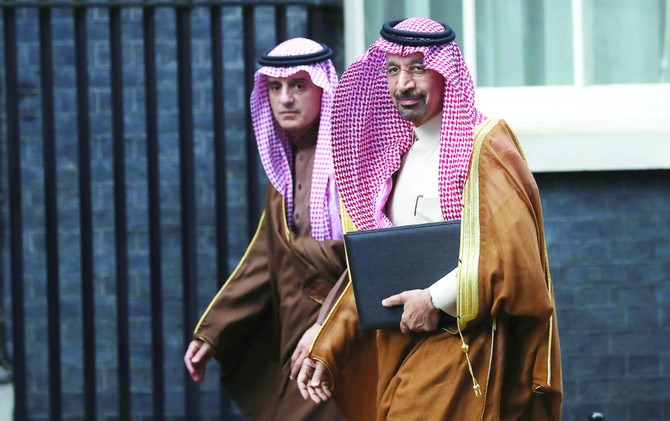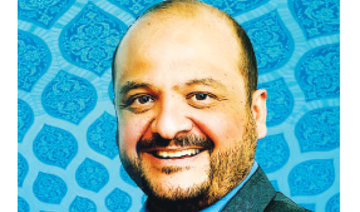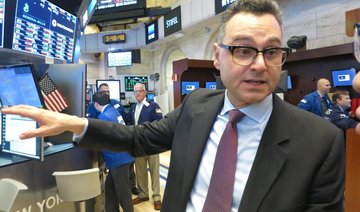DUBAI: When Khalid Al-Falih, Saudi Arabian oil minister and chairman of Saudi Aramco, told a TV interviewer of the “risk” and “concern” associated with New York financial markets, it was the first time a senior executive of the national oil company had spelled out, on the record, what others had been saying privately for some time: An American listing might not be best for Aramco.
The New York Stock Exchange had long been regarded as the front runner in the race to stage the biggest initial public offering in history. Ever since the IPO was first announced in late 2016, Wall Street’s Big Board was seen as the inevitable venue for the listing, not least because that was what the shareholder — the government of Saudi Arabia — wanted.
There were other very persuasive reasons to choose NYSE, or even its equally powerful city rival Nasdaq, over other contenders such as London or Hong Kong, for the international element of the IPO in addition to Riyadh’s Tadawul.
The New York exchanges are the two biggest stock markets in the world, by some way. On either, Aramco would be able to rate itself alongside the biggest companies in the energy and high-technology sectors. Each would have the liquidity and investor power to help Aramco to the ambitious $2 trillion valuation officials placed on it.
And, finally, President Trump — regarded as a friend of Saudi Arabia — made it obvious in a series of tweets that he wanted Aramco in New York, and would “appreciate” it if the Saudi company would list there.
Such big-name backing, for a while, made New York seem a shoo-in for the IPO, despite some qualms among Saudi officials and advisers about the threat from anti-terror financing laws and rigorous regulation and disclosure requirements, especially for oil companies and especially relating to reserve disclosures.
But Al-Falih spelt out a more serious worry for Aramco. It was not laws that concerned him, he said, in a reference to the Justice Against State Terrorism Act and Sarbanes Oxley laws, but “litigation and liabilities.”
He explained specifically that on his mind were the big lawsuits brought against five oil companies in New York City by the mayor Bill de Blasio on charges that they had misled the whole world on the effects of climate change over many years.
The charges were “frivolous,” he said, adding: “Quite frankly, Saudi Aramco is too big and too important for the Kingdom to be subjected to that kind of risk.”
Whatever Al-Falih thinks of the climate change actions, they are not seen as “frivolous” in the US. When the charges were leveled against BP, Chevron, ConocoPhilips, Exxon Mobil and Royal Dutch Shell earlier this year, they were just the latest in a barrage of legal actions in California, Texas, and New York State.
At the CERAWeek energy conference in Houston, Texas, last week, the climate change actions were spoken of as a serious threat to the oil companies and their basic product. They compared them to the onslaught against “Big Tobacco” in the 1990s that wiped billions of dollars off their valuations and threatened their very existence.
One oil expert, who did not wish to be named, said: “This legal campaign against the oil companies has all the signs of being carefully coordinated across the country, and is highly organized from state to state. It is a political campaign, masking as an environmental action.”
Some of the oil companies under investigation have had to go back decades in their records in an attempt to prove that they did not knowingly mislead shareholders, customers, and investors about climate change risks. The legal costs of defending the actions will be enormous and will last for years.
Aramco executives are said to regard being caught up in a US campaign against Big Oil with horror. “They could have lived with the Jasta laws — as Saudi business already does in the US — but this was the final straw,” said an oil industry analyst who did not want to be named.
The climate change threat does not necessarily amount to a deal-breaker for Aramco in New York. One expert on Saudi oil, Ellen Wald, author of the forthcoming book “Saudi Inc”, tweeted about Al-Falih’s comments: “He is posturing here — he’s preparing negotiations before (Crown Prince Mohamed bin Salman) visits New York. More than any exemptions from London Stock Exchange, NYSE or Securities and Exchange Commission, they (Aramco) want de Blasio and state attorney generals to quit with ‘frivolous’ climate lawsuits.”
Whether posturing or serious concerns, the climate change lawsuits look certain to be on the agenda of the official party accompanying the royal visit in talks with US politicians, Trump included.
It is difficult to see, however, what even the president can do to stop legal actions brought by city mayors or state legal officers, no matter how much he wants to get Aramco to list in his hometown.


New York allure fades for Saudi Aramco as ‘frivolous’ climate change actions loom
New York allure fades for Saudi Aramco as ‘frivolous’ climate change actions loom

- Threat of climate change lawsuits makes US listing for Aramco less attractive
- Aramco too big and too important for KSA to be subjected to that kind of risk — oil minister
Saudi foreign minister arrives in Poland on official visit

- Prince Faisal bin Farhan will meet Polish counterpart on Monday
LONDON: Saudi Minister of Foreign Affairs, Prince Faisal bin Farhan, arrived in the Polish capital, Warsaw, on an official visit on Sunday.
He is scheduled to meet on Monday with Radoslaw Sikorski, the Polish Deputy Prime Minister and Minister of Foreign Affairs, the Saudi Press Agency reported.
They will discuss relations between the two countries and ways to strengthen them across various fields, SPA added.
© 2026 SAUDI RESEARCH & PUBLISHING COMPANY, All Rights Reserved And subject to Terms of Use Agreement.














